So, how much does it cost to build a taxi app?
Taxi app development costs between $30,000 and $180,000. It depends on the app platform (iOS-Android), complexity, app developers, and feature set.
With the recent rise in the taxi app market reaching billions in revenue, there are a lot of people who want to build a taxi app.
Now, every idea is unique, and if you want to know how much cost will convert your idea to a taxi app, this complete guide to taxi app development cost is for you.
Here, we shall be discussing all you need to know about understanding and estimating the cost to develop a taxi app.
Types of Taxi Apps & Related Cost
Much like any other form of on-demand app development, taxi app solutions are broken down into several categories.
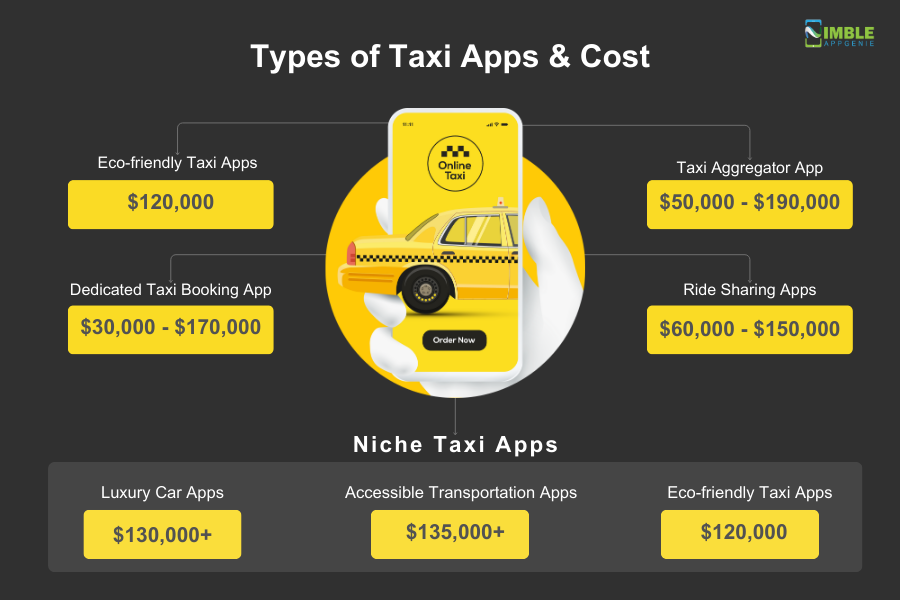
Across different types of taxi applications, the cost drastically differs. Let’s look at a detailed breakdown below.
1. Dedicated Taxi Booking App: $30,000 – $170,000
Let’s start with one of the most common types of taxi apps, dedicated taxi booking apps. Popular taxi booking apps like Uber, Lyft, and Bolt fall within this category.
The basic idea here is to connect passengers with drivers from a specific fleet owned or partnered with the app.
- Features
Basic functions like ride booking, fare estimation, driver tracking, and in-app payment.
- Cost
Relatively lower taxi app development cost, ranging from $30,000 to $170,000 for basic features. More advanced features like surge pricing or real-time traffic integration can increase the cost.
2. Taxi Aggregator App: $50,000 – $190,000
The second on the list are taxi aggregator apps.
They act as a platform connecting independent taxi drivers with passengers. Due to the ability for anyone to join the platform as a service provider, they are also popular Gig apps.
- Features
Broader vehicle options, often including budget to luxury choices. Additional features like carpooling, multi-passenger booking, and fare comparison are common.
- Cost
Generally higher development cost compared to dedicated apps, ranging from $50,000 to $190,000 for basic features. Advanced features like dynamic pricing or driver verification can significantly increase the cost.
3. Ride Sharing Apps: $60,000 – $150,000
The third category comprises ridesharing apps, distinguished by their emphasis on sharing rides among users headed in the same direction.
Some common examples include BlaBlaCars, Hitch, and Uber.
These platforms connect individuals looking for transportation to share a common journey, promoting cost-efficiency and reducing traffic congestion.
- Features
Ride matching, real-time tracking, and cost-sharing capabilities. Advanced options may include route optimization, group ride coordination, and enhanced safety features.
- Cost
Ridesharing app development costs range from $60,000 to $150,000 for basic functionalities. The inclusion of advanced features like dynamic route planning or additional safety measures can contribute to an increase in overall development expenses.
4. Niche Taxi Apps
Beyond the three main types, niche taxi apps cater to specific needs and offer unique features. Here are some examples:
i) Luxury Car Apps: $130,000+
As the name suggests, luxury car service apps are dedicated to high-end clientele, serving them with premium vehicles and personalized service.
While not the most common type, these platforms do exist in significant numbers and churn out high revenue.
- Features
Luxurious cars, professional drivers, and amenities like in-car entertainment and refreshments.
- Cost
Higher development cost due to premium features and targeted audience, potentially exceeding $130,000 for basic features.
ii) Accessible Transportation Apps: $135,000 +
It goes without saying some of us are differently abled.
And just like how the dating market has grown to accommodate gender fluidity via LBGTQ apps, the taxi market also comes forward in the form of Access bile transportation platforms.
Here, passengers with disabilities can avail of wheelchair-friendly vehicles and trained drivers.
- Features
Accessible vehicles, trained drivers, and additional features like real-time tracking and emergency assistance.
- Cost
Development costs can be similar to dedicated taxi apps, but additional accessibility features might increase to $135,000 or more for basic features.
iii) Eco-friendly Taxi Apps: $120,000
With the green movement in full force, it’s time to consider EVs and RoboTaxi Solutions.
Thus, eco-friendly taxi apps offer environmentally conscious riders with electric or hybrid vehicles.
- Features
Eco-friendly vehicles, carbon offsetting programs, and green driving initiatives.
- Cost
Development costs can be comparable to dedicated taxi apps, but integrating eco-friendly features might push it closer to $120,000 for basic features.
Now that we are done with the basic cost to create a taxi app based on the type, it’s time to look at some of the most popular apps and the cost to develop an app like them.
Popular Taxi Apps and Cost To Clone Them
It goes without saying that the market is filled with best taxi booking apps.
More often than not, popular apps like Uber, LYFT, and Grab are forces that inspire startups and businesses to invest in app development and build their own taxi app.
This gives us the question, “How much does it cost to build a Taxi app like X?” let’s answer this question for some popular platforms below.
1. Cost To Build An App Like Uber: $30,000 – $120,000+
Uber Statistics shows us the great success of this taxi booking market leader.
A global app known for real-time ride booking, fare estimation, driver tracking, in-app payment, and ride rating/sharing,
So, how much does it cost to build an app like Uber?
Uber app development costs range from $30,000 to $70,000 for basic version and $90,000-$120,000+ for advanced features.
The addition of other functionalities and elements to clone app development can further increase the cost to create an App Like Uber.
2. Cost To Build An App Like LYFT: $35,000 – $110,000+
Another popular taxi app in the market that has inspired a lot of people is LYFT, operating in the USA and Canada, which offers similar features to Uber, along with shared rides and green car options.
It’s safe to say, a lot of people want to build an app like LYFT.
Cloning costs i.e. Lyft-like app development costs range from $35,000-$55,000 for basic features to $50,000-$110,000+ for advanced features.
3. Cost To Build An App Like BlaBlaCar: $30,000 – $125,000+
Anyone who wants to create a ride-sharing app, says they want to build an app like BlaBlaCar.
That’s the popularity and sheet market dominance of this platform.
A renowned carpooling platform, it offers features for trip posting, user profiles, in-app messaging, rating systems, and secure payment options.
The estimated cost for basic functionalities ranges from $30,000 to $60,000, while integrating advanced features could elevate the cost to build an app like BlaBlaCar to $60,000-$125,000 or more.
4. Cost To Build An App Like Bolt: $30,000 – $120,000+
Do you want to build an app like Bolt?
Cloning Bolt, a leading ride-hailing service, focuses on replicating essential features such as ride booking, fare transparency, and multi-passenger booking.
estimate of the taxi app development cost range from $30,000-$40,000 for basic functionalities, including user profiles, to $40,000-$120,000+ for advanced features like real-time tracking, in-app payments, and enhanced security measures.
Actual expenses may vary based on project specifics, customization needs, and chosen technology stack.
5. Cost To Build An App Like Grab: $30,000 – $140,000+
Grab, operating in Southeast Asia, offers a versatile range of services, including ride-hailing, food delivery, payments, and carpooling.
So, what would be the cost to build an app like Grab?
Cloning costs for Grab are estimated at $30,000-$40,000 for basic features and $60,000-$140,000+ for advanced features.
So, these are some popular taxi apps and the cost to clone them. Now, with this out of the way, let’s look at the various factors which affect the cost of building a taxi app.
Factors That Affect Cost To Build A Taxi App
Mobile app development cost can be hard to predict, same goes for Uber clone app development cost.
And one of the main reasons behind it is, the various factors involved.
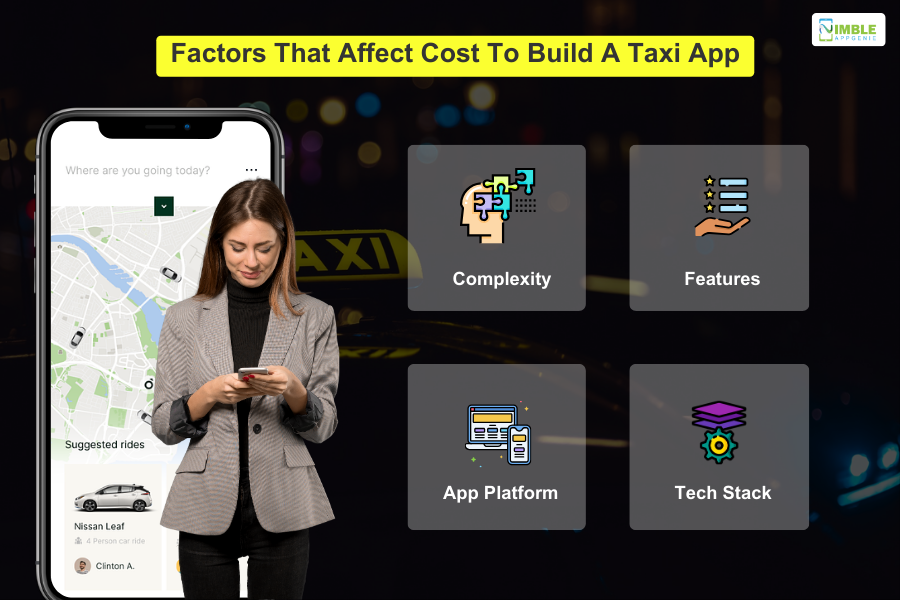
Due to these factors, it’s next to impossible to get accurate cost estimation without accounting for various project specifications.
Speaking of which, let’s see what these factors are:
Factor 1: Complexity
The very first factor that affect cost to develop a taxi booking app is complexity.
As a general rule of thumb, the more complex a solution is, the more it’s going to cost. And the simpler it is, the cheaper the cost will be.
But why?
Well, it’s simple. The complexity of software development directly means higher development time, more resources, and required of more experienced developers.
In any case, let’s look at the table below to understand the same better.
| Complexity Factor | Feature Complexity | Backend Complexity | Platform Complexity | Estimated Cost Range |
| Basic | Ride booking, fare estimation, driver tracking | User authentication, data storage, and ride requests | Single platform (Android or iOS) | $15,000 – $25,000 |
| Intermediate | Car selection, payment options, trip history, driver ratings | Real-time communication and payment processing | Cross-platform development | $30,000 – $60,000 |
| Advanced | Real-time traffic updates, dynamic pricing, carpooling, multi-passenger bookings | Advanced algorithms, AI integrations | Cross-platform development | $60,000 – $100,000+ |
Factor 2: Basic and Advanced Features
When we are talking, if you want to make your app successful among people, you need to cover good features.
Speaking of taxi apps, it is important to right feature set for the same reason. Now, depending on the feature you are planning to include in the app, the total cost to develop the app can be affected highly.
Take a look at the set of basic and advanced features as well as the associated cost breakdown for taxi app development.
| Basic Features | Description | Estimated Cost |
| User Registration/Login | Sign up/in using your email, phone number, or social media account. | $2,000 – $5,000 |
| Location Tracking | Automatically detects user’s location for pick-up and drop-off. | $1,000 – $3,000 |
| Booking & Ride Management | Book rides instantly or schedule for later, track ride progress, and manage bookings. | $3,000 – $8,000 |
| Fare Estimation & Payment | Get upfront fare estimates and pay securely through in-app wallet or integrated payment options. | $4,000 – $10,000 |
| Driver Information & Rating | View driver profile, photo, car details, and rating before booking. | $1,000 – $2,000 |
| Real-time Tracking | Track your driver’s location on the map in real-time. | $2,000 – $5,000 |
| In-app Chat/Call | Communicate with the driver directly through the app. | $1,000 – $3,000 |
| Booking History & Receipts | Access past booking history and download receipts. | $1,000 – $2,000 |
Moving on from basic features to more advanced ones, mentioned below:
| Advance Feature | Description | Estimated Cost |
| Multiple Vehicle Types | Choose from different car categories (sedan, SUV, luxury) based on needs and budget. | $2,000 – $5,000 |
| Ride Sharing | Share rides with others to save costs and reduce traffic congestion. | $3,000 – $8,000 |
| Multi-stop Booking | Add multiple pick-ups and drop-off points for a single ride. | $1,000 – $3,000 |
| Pre-booking & Airport Transfers | Schedule rides in advance for important appointments or airport pickups. | $2,000 – $5,000 |
| Corporate Accounts & Billing | Manage business travel expenses with centralized billing and account management. | $5,000 – $10,000 |
| Loyalty Programs & Rewards | Earn points and rewards for frequent rides and unlock special benefits. | $3,000 – $8,000 |
| Accessibility Features | Cater to riders with disabilities through features like wheelchair-accessible vehicles or call assistance. | $2,000 – $5,000 |
| AI-Powered Driver Matching & Route Optimization | Match riders with the closest available drivers and optimize routes for faster travel times. | $5,000 – $12,000 |
Factor 3: App Platform
Another big factor affecting on-demand taxi app development costs is the app Platform.
You see when you are developing a taxi booking mobile application, you need to go with a native platform that includes:
Or hybrid app development with technologies like Flutter or React native.
Now, your choice of platform can highly affect how much it costs to build a taxi app since each platform has entirely different requirements.
Let’s look at the breakdown below:
| Platform | Advantages | Disadvantages | Estimated Cost |
| Cost To Develop Android App | – Excellent performance and user experience. – Access to the full range of Android features. | – More development time and cost compared to cross-platform. – Separate maintenance for each platform. | $70,000 – $160,000 |
| Cost To Develop iOS App | – High performance and smooth UI/UX. – Leveraging iOS-specific features. | – Higher development costs compared to cross-platform. – Separate maintenance for each platform. | $65,000 – $170,000 |
| Cross-Platform (React Native, Flutter) | – Develop once and deploy on both Android and iOS. – Reduced development time and cost. | – Performance might be slightly lower than native apps. – Limited access to platform-specific features. | $50,000 – $100,000 |
| Cost To Develop Web App | – Accessible across multiple platforms (desktop, mobile) . – No app store download required. | – Limited offline functionality. – Less engaging user experience compared to native apps. | $30,000 – $70,000 |
Factor 4: Tech Stack
It’s time to look at the app tech stack for taxi booking solutions as well as its effect on overall app development cost.
| Category | Technology Options | Estimated Cost Range |
| Frontend Framework | React Native / Flutter / Xamarin / Ionic | $30,000 – $80,000 |
| Backend Framework | Node.js (Express.js) / Django / Ruby on Rails | $40,000 – $100,000 |
| Database | MongoDB / PostgreSQL / Cassandra / MySQL | $20,000 – $60,000 |
| Real-time Database | Firebase Realtime Database / AWS DynamoDB | $15,000 – $50,000 |
| Authentication | Firebase Authentication / OAuth 2.0 / Auth0 | $10,000 – $30,000 |
| Mapping and Geolocation | Google Maps API / Mapbox / HERE | $15,000 – $40,000 |
| Payment Gateway | Stripe / Braintree / PayPal / Square | $20,000 – $50,000 |
| Push Notifications | Firebase Cloud Messaging (FCM) / OneSignal | $10,000 – $30,000 |
| Cloud Hosting | AWS / Microsoft Azure / Google Cloud Platform | $20,000 – $80,000 |
| Containerization | Docker / Podman / rkt | $15,000 – $40,000 |
| Orchestration | Kubernetes / Docker Swarm / Apache Mesos | $20,000 – $60,000 |
| Monitoring | Prometheus + Grafana / ELK Stack | $15,000 – $40,000 |
| Version Control | Git / Mercurial / SVN | $5,000 – $20,000 |
| Continuous Integration | Jenkins / CircleCI / GitLab CI | $10,000 – $30,000 |
| App Security | JSON Web Tokens (JWT) / OAuth 2.0 / API Keys | $10,000 – $30,000 |
| API Documentation | Swagger / OpenAPI / Postman | $5,000 – $20,000 |
| Development Environment | VS Code / IntelliJ IDEA / Atom | $5,000 – $20,000 |
Now that we are done we the factor, let’s move to the next section of taxi app development cost guide and look at the cost involved.
Cost To Hire Taxi App Developers
If you want to develop a taxi app, you need to find an app developer.
Now, the market is filled with mobile app developers who can turn your idea into digital products. However, you can’t just work with anybody, right?
Well, there are multiple steps to hiring the right ones, and your choice also highly affects the cost to hire app developers.
To make it easier to understand, we have divided it into different aspects. Let’s get right into it.
1. Type of Development Team
First things first, there are various ways to hire a team of app developers.
For instance, you can outsource to a development company or assemble an in-house team.
In fact, the in-house vs outsourcing debate has been raging for a while now. Let’s see which one is right for you and how each one costs uniquely.
| Type of Development Team | Description | Estimated Cost Per Hour (USD) | Advantages | Disadvantages |
| Staff Augmentation | Hire individual developers on contracts to fill skills gaps in your existing team. | $50 – $100 | – More control over the development process. – Easier integration with the existing team. | – Requires managing contracts and payroll. – Higher initial investment in recruitment. |
| In-House Team | Build and manage your own dedicated team of developers. | $80 – $150 | – Maximum control over the project. – Deep understanding of your business needs. | – Higher long-term costs with salaries, benefits, and infrastructure. – Less flexibility to scale up or down quickly. |
| Outsourced Development | Contract with a third-party development company to handle the entire project. | $25 – $50 | – Reduced costs compared to in-house team. – Access to a wider pool of talent and expertise. | – Less control over development processes and communication. – Potential cultural and time zone challenges. |
More often than not, businesses including Fortune 500 and start-ups choose to outsource projects like taxi apps to a Mobile App Development Company.
Reason being, it might cheaper, way more effective, and much safer.
2. Team’s Expertise & Experience
Apart from the general difference between cost to hire android app developer and iOS one, their experience and expertise also highly affect the same.
Let’s look at a breakdown below.
| Team Expertise & Experience | Description | Estimated Cost Per Hour (USD) |
| Junior Developers (1-2 years experience) | Basic coding skills and limited experience with mobile app development. Suitable for basic features and UI/UX development. | $25 – $50 |
| Mid-Level Developers (3-5 years experience) | Proficient in mobile app development, can handle most features and integrate APIs. Good balance between cost and experience. | $50 – $80 |
| Senior Developers (5+ years experience) | Strong technical skills and expertise in complex features and optimization. Ideal for advanced features and scalability. | $80 – $120 |
| Project Manager | Leads the development team, manages tasks, timelines, and budget. Essentials for large or complex projects. | $75 – $100 |
| UI/UX Designer | Creates the app’s interface and user experience, ensuring both functionality and aesthetics. | $50 – $80 |
| QA Tester | Test the app for functionality, bugs, and performance. Crucial for a smooth user experience. | $40 – $60 |
3. Developer’s Location
The development team’s location also highly affects the cost to build an Uber-like app. How? Well, let’s say, you want to hire React native app developers.
So, the cost to hire react native app developers highly differs based on the location. Most expensive in the United States and cheapest in Asian countries.
Let’s look at a much more detailed breakdown below.
| Developer Location | Estimated Cost Per Hour (USD) | Advantages | Disadvantages |
| North America (US, Canada) | $150 – $250 | – High level of experience and expertise. – Strong communication and project management. | – Highest overall cost. – Potential time zone differences. |
| Western Europe (UK, Germany, France) | $100 – $150 | – Solid experience and technical skills. – Good quality standards and work ethic. | – Higher cost than some other regions. – Potential cultural differences. |
| Eastern Europe (Poland, Hungary, Romania) | $40 – $100 | – Cost-effective compared to Western regions. – Growing pool of talented developers. | – Lower average experience level. – Potential communication challenges. |
| Asia (India, China, Vietnam) | $20 – $80 | – Very low cost compared to other regions. – Large pool of developers with diverse skills. | – Lower project management standards. – Potential IP security concerns |
So, this is how much it costs to hire taxi app developers. And with this out of the way, let’s look at the time it takes to develop a taxi app.
How Long Does It Take To Develop Taxi App?
How long does it take to build a taxi app?
This is the second most common question after, “How much does a taxi app cost?”
The average taxi app development time is an estimated 24-44 weeks (approximately 6-11 months). Just like cost, it depends on a lot of different factors.
Includes:
- App Complexity
- Team Size and Experience
- Development Approach
- Project Management
- Changes and Iterations
- Testing and Bug Fixing
With this out of the way, let’s look at a detailed breakdown of taxi app development times below.
| Phase | Description | Estimated Time |
| 1. Planning and Discovery | – Define project scope and goals. – Conducted market research and competitor analysis. – Create user personas and user flow diagrams. – Choose a tech stack and development approach. | 2-4 weeks |
| 2. Design | – Create wireframes and prototypes. – Iterate on designs based on user feedback. – Develop visually appealing and user-friendly UI/UX design. | 4-6 weeks |
| 3. Development | – Build backend infrastructure and APIs. – Develop frontend apps for chosen platforms (Android, iOS, web). – Integrate third-party services (maps, payment gateways, etc.). – Implement features and functionality. | 12-24 weeks |
| 4. Testing | – Conduct thorough app testing to identify and fix bugs. – Perform user testing to gather feedback and refine the app. – Ensure app compatibility with different devices and OS versions. | 4-6 weeks |
| 5. Deployment | – Submit the app to app stores for approval. – Prepare marketing and launch materials. – Monitor app performance and user feedback post-launch. | 2-4 weeks |
The Effect of Urgency (& Development Time) on cost to build a taxi app
While a faster taxi app launch might grab market attention, rushing development often translates to higher costs and lower quality.
Premium developer rates, compromised features, and potential bugs can significantly eat into your budget.
However, a longer timeframe allows for standard rates, thorough testing, and a more user-friendly app in the long run.
That’s why it’s important to find the right balance between urgency and cost to make a taxi app, prioritizing core features, and choosing experienced developers are key to building a successful taxi app within your budget and timeline.
Total Estimation of Taxi App Development Cost
Average app development cost to build a taxi solution ranges from $30,000 to $250,000. Now, this is a big range and many people struggle to put their projects on the spectrum.
So how do you estimate the total cost of taxi app development for your project?
Well, the best way to do so is to contact a development form like Nimble AppGenie and our team will give you an accurate quote based on your project requirements.
Or else, you can take the harder way, which is:
- Choose the type of taxi app you want to develop or if you want to clone an app like Uber,
- and check the related cost
- Go through the various factors which affect the cost and put them parallel to your requirements.
- Consult developers and finalize which ones they want to hire.
- estimate development time and multiply it by the developer’s hourly rate.
- Match the urgency to the development budget.
This is how you can calculate taxi booking app development costs for your project.
Speaking of cost, it’s time to look at how to optimize app development costs.
Ways To Optimize Taxi App Development Cost
The cost to develop a taxi app can be too much sometimes.
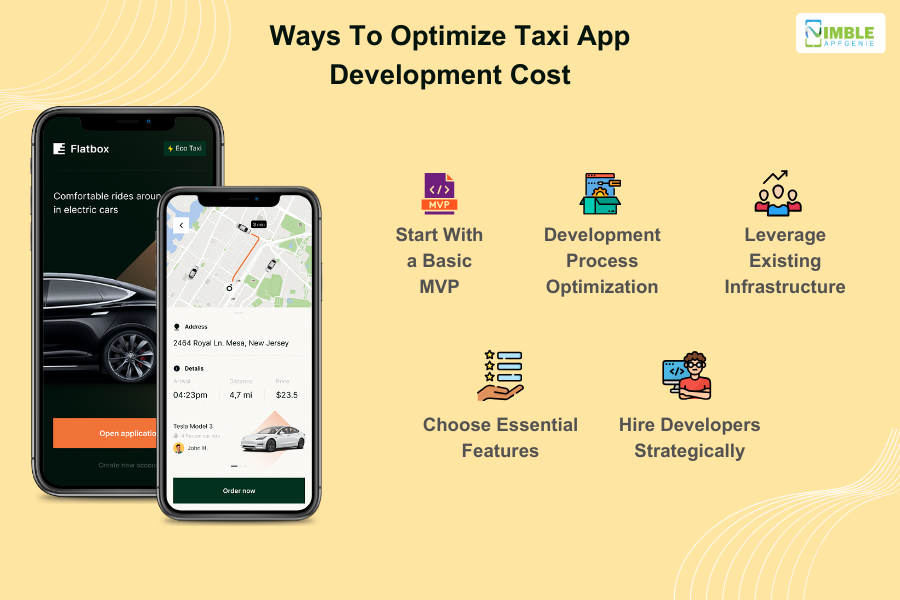
This can deter a lot of people away from invest in app development. But if you are determined to create your own taxi app, there are ways to optimize the project cost.
Let’s see how you can do it.
1. Start with a basic MVP
Do you think the taxi app development cost is too much? Well, just go for MVP Development.
For those who are new to the concept, MVP stands for a minimum viable product. These are barebones versions of the taxi app.
These are often developed before the final taxi app solution as a way to validate the concept and gather funds for app development.
So, if you want to minimize the cost to develop a taxi This is one of the ways.
2. Development Process Optimization
Streamlining your taxi app development process is like navigating rush hour traffic – avoid unnecessary detours and save fuel (money!).
That’s why you should plan your features, prioritize, and iterate based on user feedback. Embrace agile methods, keep everyone talking, and let automation catch coding boo-boos early.
And don’t reinvent the wheel – use existing solutions for maps, payments, and notifications.
By optimizing your journey, you’ll launch your app faster and reach your cost-effective destination in style.
3. Leverage existing infrastructure
Don’t build a taxi from scratch! Utilize existing IT Infrastructure.
In other words, take advantage of available mapping APIs, payment gateways, and push notification services.
This saves development time as well as taxi app development cost while offering reliable, tested technology.
4. Choose essential features
To save on cost, start with the core functionalities that make your app tick – ride booking, driver tracking, and payments.
Fancy features can wait for user feedback and future iterations.
This keeps your initial MVP (minimum viable product) lean and cost-effective. It is one of the best ways to optimize the development cost.
5. Hire developers strategically
If you want to save money, hire mobile app developers strategically.
Consider outsourcing specific tasks like backend development or UI/UX design to skilled professionals at potentially lower costs.
Don’t hesitate to leverage agencies for niche skills when needed.
Well, speaking of which, speaking of higher right app developers, this brings us to our next process.
Nimble AppGenie – Budget Friendly Taxi Apps with Expert Developers
Don’t worry about developing taxi app.
We have got you covered.
Nimble AppGenie is a market-leading taxi app development company. We have helped Fortune 500 to Start-ups develop the next best taxi app (Affordable)
Among our 700 projects and 95% client satisfaction, we have worked on some of the great names in the taxi market.
Pearl Cab is one such example.
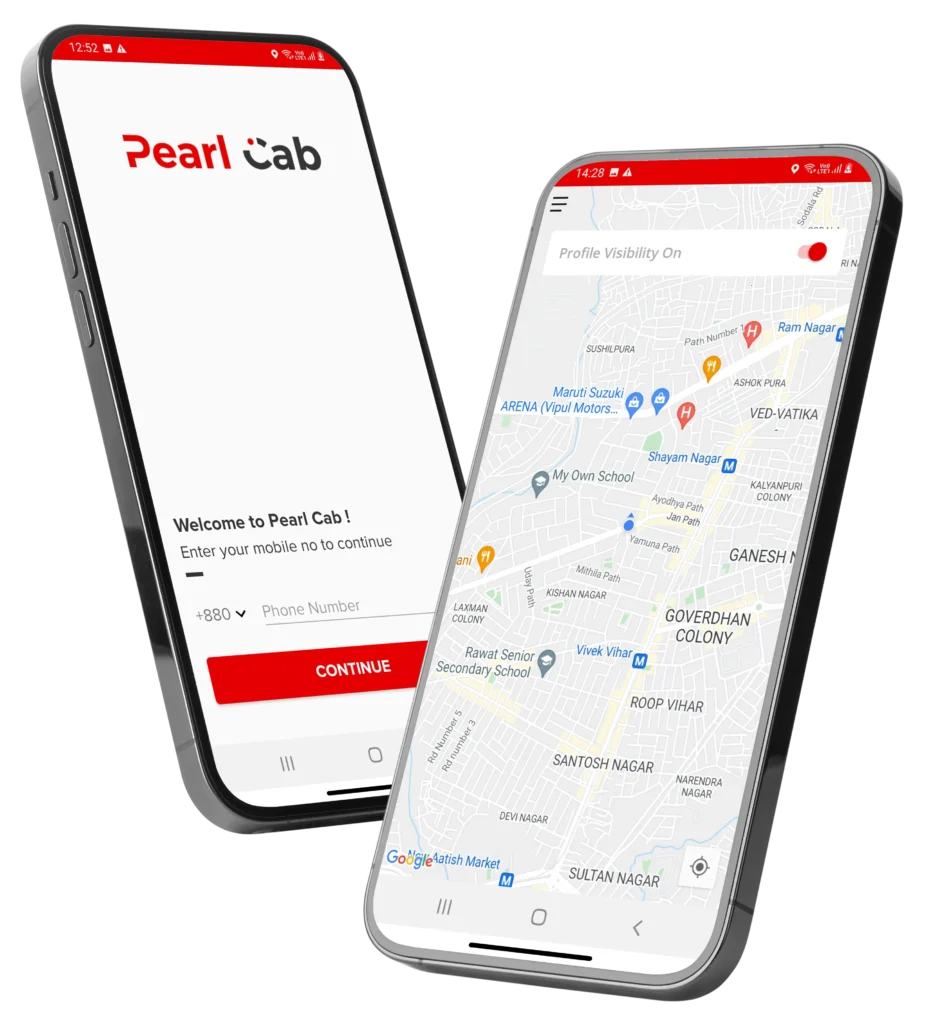
Our team of app developers and designers has what it takes to turn your ideas into market-leading digital products.
Contact us and we will assign you a team within 24 hours.
Conclusion
There are various factors that affect the total cost to develop a taxi app. The type of app, features, platform, technology stack, and developer teams all play a significant role. Popular taxi apps like Uber, Lyft, BlaBlaCar, Bolt, and Grab provide benchmarks for estimating costs, with ranges from $30,000 to $250,000.
Optimizing costs, starting with a basic MVP, streamlining the development process, leveraging existing infrastructure, selecting essential features, and strategically hiring developers are key strategies. Estimating development time and finding the right balance between urgency and budget are crucial for a successful taxi app within your financial scope.
Extra: Taxi App Development Cost Infographic
Here’s an easy-to-understand breakdown of cost to build a taxi booking app in infographic format.

FAQs
The cost of developing a taxi booking app can vary based on factors such as the type of app, features, and complexity. For a dedicated taxi booking app with basic features, it may cost between $10,000 and $30,000. For more advanced features or aggregator apps, the cost can range from $20,000 to $100,000 or more. Cloning popular apps like Uber or Lyft can cost between $10,000 and $120,000+ depending on the features.
Several factors influence the cost of taxi app development, including:
- Type of App: Dedicated, aggregator, or niche apps.
- Complexity: Basic, intermediate, or advanced features.
- App Platform: Android, iOS, or cross-platform development.
- Tech Stack: The technology used for frontend, backend, databases, mapping, payment gateways, etc.
- Developer Costs: The type of development team, their expertise, and location.
Yes, taxi booking apps can be profitable, especially in markets with a high demand for ride-hailing services. The revenue model typically includes a percentage of each ride fare, surge pricing during peak times, and partnerships with drivers or fleets.
The development time for a taxi app can vary based on complexity. Generally:
- Basic features may take around 3-6 months.
- Intermediate features may take 6-12 months.
- Advanced features can take over a year.
Native taxi apps can be costlier than cross-platform apps. Cross-platform development using frameworks like React Native or Flutter can reduce costs by allowing code reuse across different platforms.
The complexity and number of features significantly impact the development cost. Basic features like ride booking and fare estimation are less expensive, while advanced features like real-time traffic updates, dynamic pricing, and carpooling increase the overall cost. The choice of technology stack for each feature also contributes to the final cost.

Niketan Sharma is the CTO of Nimble AppGenie, a prominent website and mobile app development company in the USA that is delivering excellence with a commitment to boosting business growth & maximizing customer satisfaction. He is a highly motivated individual who helps SMEs and startups grow in this dynamic market with the latest technology and innovation.
Table of Contents




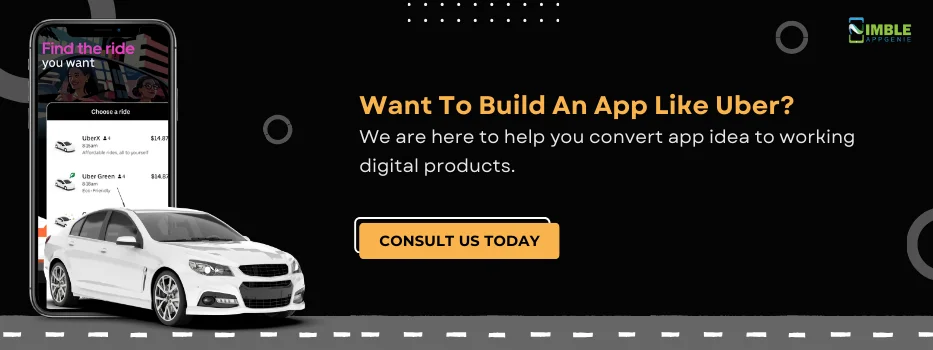
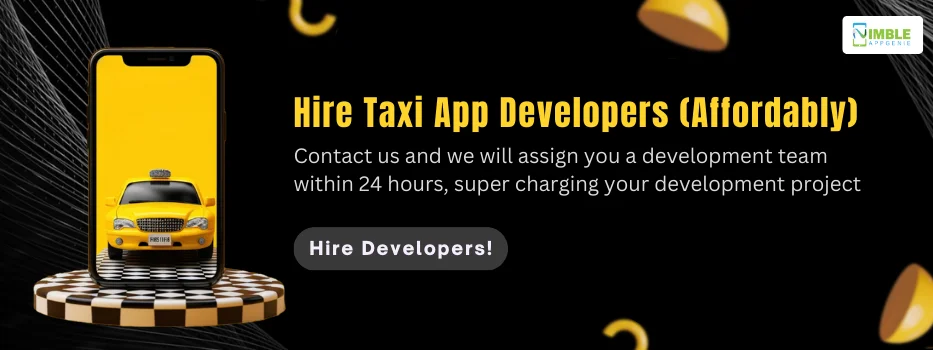
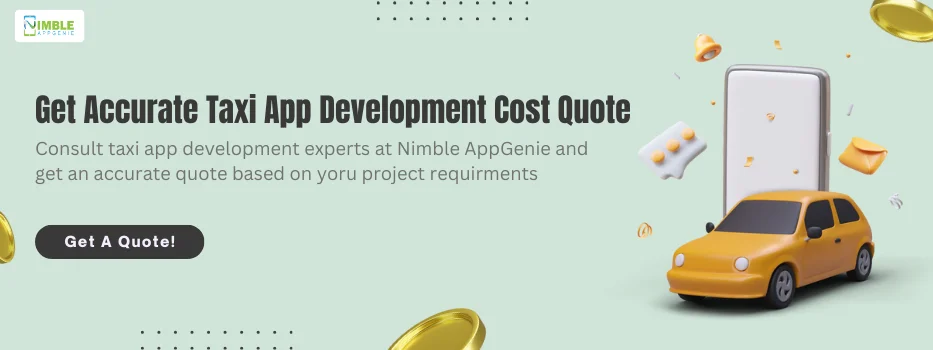




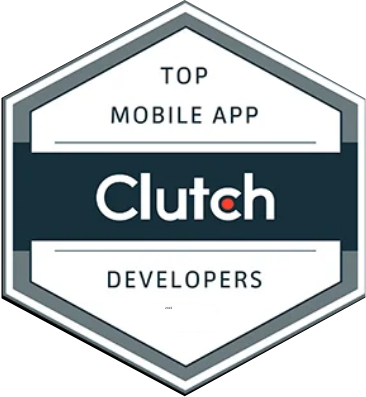
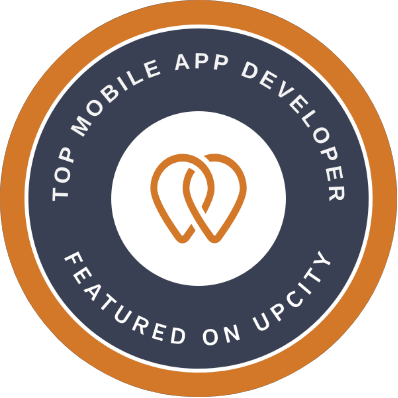
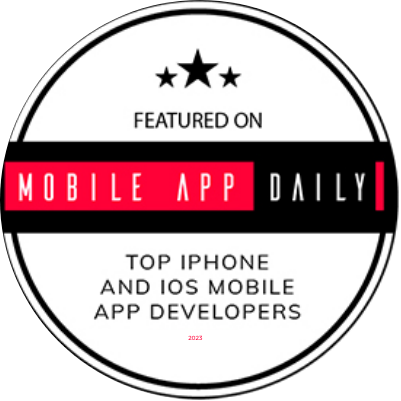
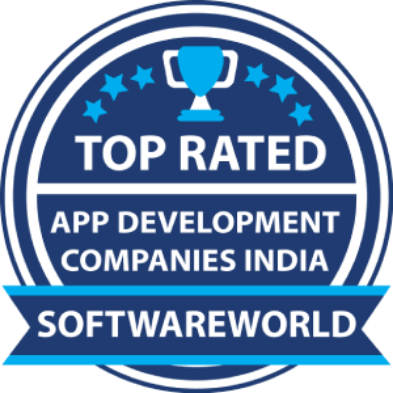
No Comments
Comments are closed.